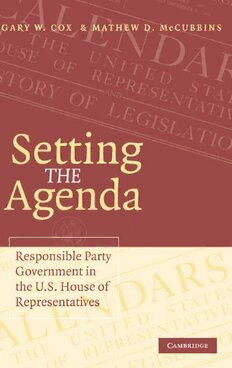
Setting the Agenda: Responsible Party Government in the U.S. House of Representatives PDF
352 Pages·2005·2.045 MB·English
Most books are stored in the elastic cloud where traffic is expensive. For this reason, we have a limit on daily download.
Preview Setting the Agenda: Responsible Party Government in the U.S. House of Representatives
Description:
Scholars of the U.S. House disagree over the importance of political parties in organizing the legislative process. On the one hand, non-partisan theories stress how congressional organization serves members' non-partisan goals. On the other hand, partisan theories argue that the House is organized to serve the collective interests of the majority party. This book advances a partisan theory and presents a series of empirical tests of that theory's predictions (pitted against others). The evidence demonstrates that the majority party seizes agenda control at nearly every stage of the legislative process in order to prevent bills that the party dislikes from reaching the floor.
See more
The list of books you might like
Most books are stored in the elastic cloud where traffic is expensive. For this reason, we have a limit on daily download.
